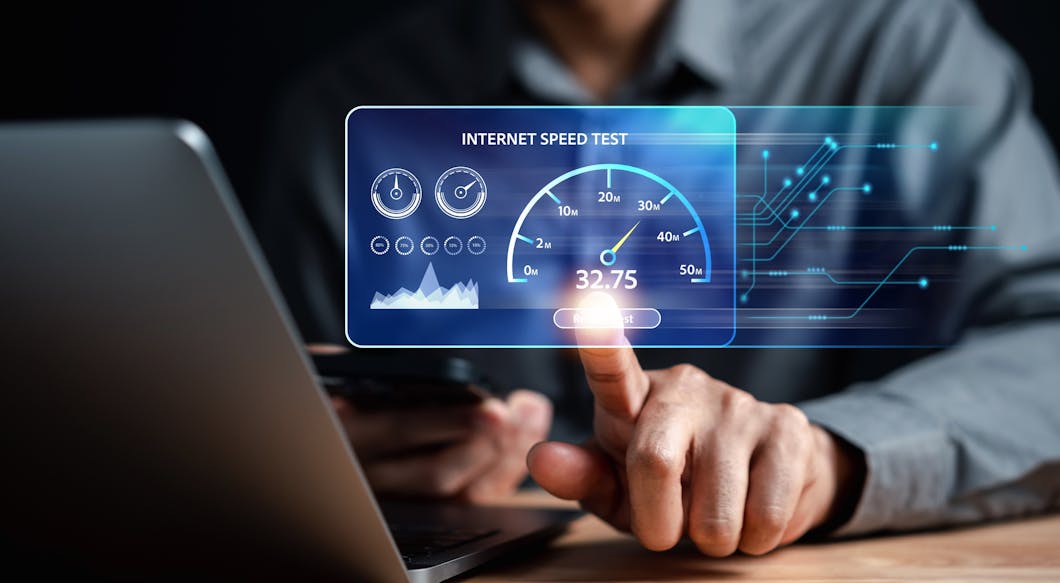
In today's fast-paced digital world, the speed of a website can make all the difference in the success of a ministry.
Visitors expect instant gratification and a seamless browsing experience, and a slow-loading website can quickly turn them away. That's why website performance optimization has become an essential aspect of online evangelism.
High-performance websites not only provide a better user experience but also have a significant impact on search engine rankings and conversion rates.
In this article, we'll delve into the importance of website speed, explore the factors that affect website performance, and provide tips and strategies to boost your website's speed.
Whether you're a mega pastor or a solo preacher, understanding why speed matters can help you stay ahead of the learning curve, and lead more people to the Good News of the Gospel.
Website speed is critical for providing a positive user experience. A fast website creates a seamless and engaging experience for users, while a slow website can lead to frustration and abandonment.
Research shows that a one-second delay in page load time can result in a 7% reduction in conversions, a 16% decrease in customer satisfaction, and an 11% drop in page views.
Slow website speed can also lead to increased bounce rates. Bounce rate is the percentage of visitors who navigate away from a website after viewing only one page.
A high bounce rate can hurt a website's search engine rankings and overall performance. According to Google, bounce rates increase by 32% as page load time goes from one second to three seconds.
The Impact of Website Speed on User Experience
How Website Speed Affects Search Engine Rankings
Website speed is also an important factor in search engine rankings. Google has indicated that website speed is one of the signals used by its algorithm to rank pages.
In 2010, Google announced that website speed would be a ranking factor for desktop searches, and in 2018, it announced that website speed would also be a ranking factor for mobile searches.
The reason for this is simple: Google wants to provide the best possible user experience for its users. A fast website delivers content quickly and efficiently, which makes for a better user experience. A slow website, on the other hand, can be frustrating for users and lead to a poor overall experience.
Website speed is critical, and the statistics back it up. Here are some important website speed statistics to keep in mind:
- According to Google, the average time it takes for a mobile landing page to load is 22 seconds. However, research shows that 53% of mobile site visitors will leave a page that takes longer than three seconds to load.
- A study by Akamai found that a two-second delay in page load time can increase bounce rates by 103%.
- Research by Google shows that a one-second delay in mobile page load times can impact conversion rates by up to 20%.
- According to Pingdom, the average load time for a webpage is 3.21 seconds on desktop and 15.3 seconds on mobile.
These statistics make it clear that website speed is critical for providing a positive user experience and a strong determining factor whether web visitors ever hear your message.
Website Speed Statistics
Common Causes of Slow Website Speed
There are many factors that can affect website speed. Here are some of the most common causes of slow website speed:
- Large images and videos: Large images and videos can slow down a website's load time. To improve website speed, it's important to optimize images and videos by compressing them and reducing their size.
- Unoptimized code: Code that is unoptimized, bloated, or contains errors can slow down a website's load time. To improve website speed, it's important to minify code, eliminate unnecessary code, and ensure that the code is error-free.
- Excessive plugins and scripts: Plugins and scripts can add functionality to a website, but they can also slow down a website's load time. To improve website speed, it's important to eliminate unnecessary plugins and scripts and ensure that the ones that are used are optimized and up-to-date.
- Lack of caching: Caching allows a website to store frequently accessed data and serve it quickly to users. Without caching, a website has to retrieve data from the server every time a user requests it, which can slow down load times.
- Poor hosting: Poor hosting can also affect website speed. A slow server or a server that is not optimized for the website's needs can lead to slow load times.
Measuring Website Speed with Tools Like GTmetrix and Google PageSpeed Insights
To improve website speed, it's important to measure it first. There are many tools available to measure website speed, including GTmetrix and Google PageSpeed Insights. These tools analyze a website's performance and provide recommendations for improvement.
GTmetrix provides a detailed analysis of a website's performance, including page speed, page size, and the number of requests made. It also provides recommendations for improvement, such as optimizing images and reducing the number of requests made.
Google PageSpeed Insights analyzes a website's performance on both mobile and desktop devices. It provides a score out of 100 and recommendations for improvement, such as reducing server response time and optimizing images.
Improving website speed requires a multi-faceted approach. Here are some strategies to consider:
- Optimize images: Large images can slow down a website's load time. To improve website speed, it's important to optimize images by compressing them and reducing their size. There are many tools available to optimize images, such as Adobe Photoshop and ImageOptim.
- Minify code: Unoptimized code can slow down a website's load time. To improve website speed, it's important to minify code by eliminating unnecessary spaces, comments, and characters.
- Utilize caching: Caching allows a website to store frequently accessed data and serve it quickly to users. By utilizing caching, a website can reduce load times and improve performance.
- Use a content delivery network (CDN): A CDN is a network of servers that deliver content to users based on their geographic location. By using a CDN, a website can reduce load times and improve performance.
- Upgrade hosting: Poor hosting can affect website speed. By upgrading to a hosting provider that is optimized for the website's needs, a website can improve performance and reduce load times.
Strategies for Improving Website Speed
A fast website provides many benefits, including increased conversions, higher engagement, and a better user experience.
By providing a seamless and engaging experience for users, a fast Christian website can increase satisfaction and loyalty.
It can also improve search engine rankings and drive more traffic to a website. Overall, a fast website can help any ministry stay up to date and relevant with their visitors.
The Benefits of a Fast Website
On the other hand, a slow website can have significant costs. Lost souls, lost ground for the Kingdom, lost donations, decreased search engine rankings, and reduced reputation are just a few of the consequences of a slow website.
Visitors expect fast and seamless experiences, and a slow website can quickly turn them away. In today's competitive digital landscape, a slow website can be a liability for a ministry.
The Cost of a Slow Website
In conclusion, website speed is critical for providing a positive user experience, achieving evangelism goals, and staying ahead of the new tech.
By understanding the factors that affect website performance and implementing strategies to improve website speed, ministries can increase conversions, drive more traffic, and improve search engine rankings.
Don't let a slow website hold you back - take action today to optimize your website's speed and provide a better user experience for both believers and those seeking Christ.
Conclusion and Call to Action
The Importance of High Performance Christian Websites
Why Speed Matters:
© Digital Dove Media LLC 2024
Amen



















